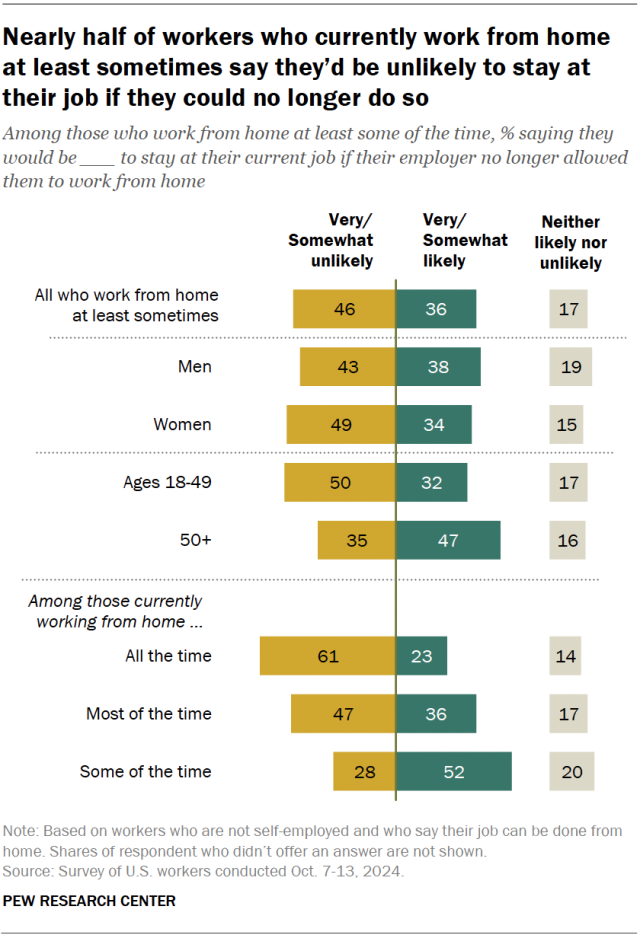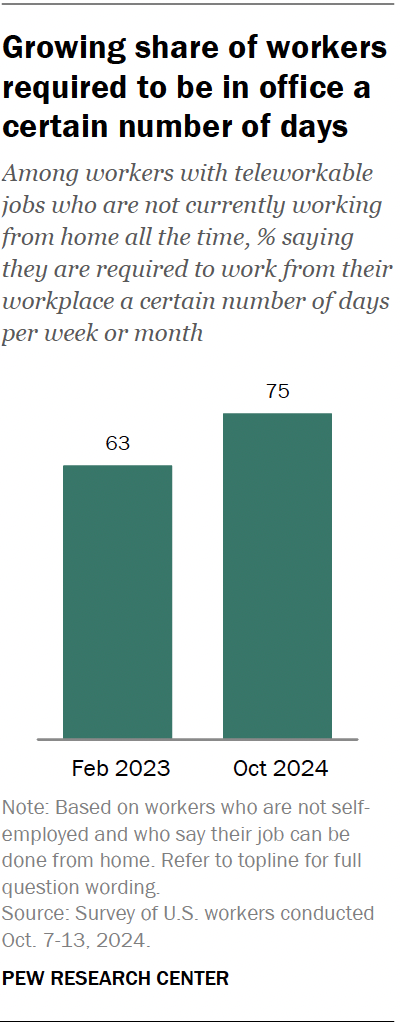A growing number of U.S. companies are requiring workers to return to the office, and President-elect Donald Trump’s incoming administration has signaled it may do the same with federal employees. But many American workers say they’d rather find a new job than give up working from home.
Pew Research Center conducted this analysis to understand how U.S. workers feel about their jobs and specifically how those with jobs that can be done from home feel about returning to their workplace.
The analysis is based primarily on the responses of 2,315 U.S. adults who are working part time or full time, have only one job or have multiple jobs but consider one their primary job, and have a job that can be done from home. The data was collected as part of a larger survey of workers conducted Oct. 7-13, 2024.
Everyone who took part is a member of the Center’s American Trends Panel (ATP), a group of people recruited through national, random sampling of residential addresses who have agreed to take surveys regularly. This kind of recruitment gives nearly all U.S. adults a chance of selection. Surveys were conducted either online or by telephone with a live interviewer.
The surveys are weighted to be representative of the U.S. adult population by gender, race, ethnicity, partisan affiliation, education and other categories. Read more about the ATP’s methodology.
Read more about the questions used for this analysis and the survey methodology.
Among employed adults who have a job that can be done from home, 75% are working remotely at least some of the time, according to a recent Pew Research Center survey.

Nearly half of workers in this group (46%) say that if their employer no longer allowed them to work from home, they would be unlikely to stay at their current job. This includes 26% who say they’d be very unlikely to stay.
A smaller share (36%) say they’d be likely to stay at their job, with 20% saying they’d be very likely to do so. And 17% say they’d be neither likely nor unlikely to stay at their job. (These shares are based on workers who are not self-employed.)
Some groups of workers are more likely than others to say they might leave their job if their employer no longer allowed them to work from home.
- Women are somewhat more likely than men to say this (49% vs. 43%).
- Workers younger than 50 are more likely than older workers to say this (50% vs. 35%).
- Workers who currently work from home all the time are more likely than those who do so most or some of the time to say this (61% vs. 47% and 28%).
These views also differ by workers’ level of job satisfaction. Workers who are not highly satisfied with their job are more likely than those who are to say they’d leave their job if they could no longer work from home. About half (52%) of workers who are somewhat, not too or not at all satisfied with their job say this, compared with 41% of workers who are extremely or very satisfied with their job.
More workers now say their employer requires a certain amount of in-office time

Among workers who are not self-employed, a growing share with jobs that can be done from home say they’re now required to work from their office, workplace or job site a certain number of days per week or month. Among those who aren’t currently working from home all the time, 75% say their employer has put these in-person work requirements in place, up from 63% in early 2023.
Most hybrid workers – those whose schedules involve working from home most or some of the time – don’t want to work from home all the time. Among hybrid workers, only 24% say they’d work from home all the time if they could choose. A majority (72%) say they’d choose a hybrid arrangement.
Similarly, 63% of those who rarely or never work from home now say that, if they could choose, they’d work from home most or some of the time. About one-in-five (19%) say they’d choose to work from home all the time, and 17% say they’d opt for rarely or never working from home.
Note: Read more about the questions used for this analysis and the survey methodology.
